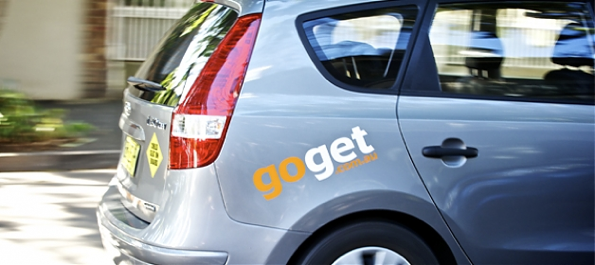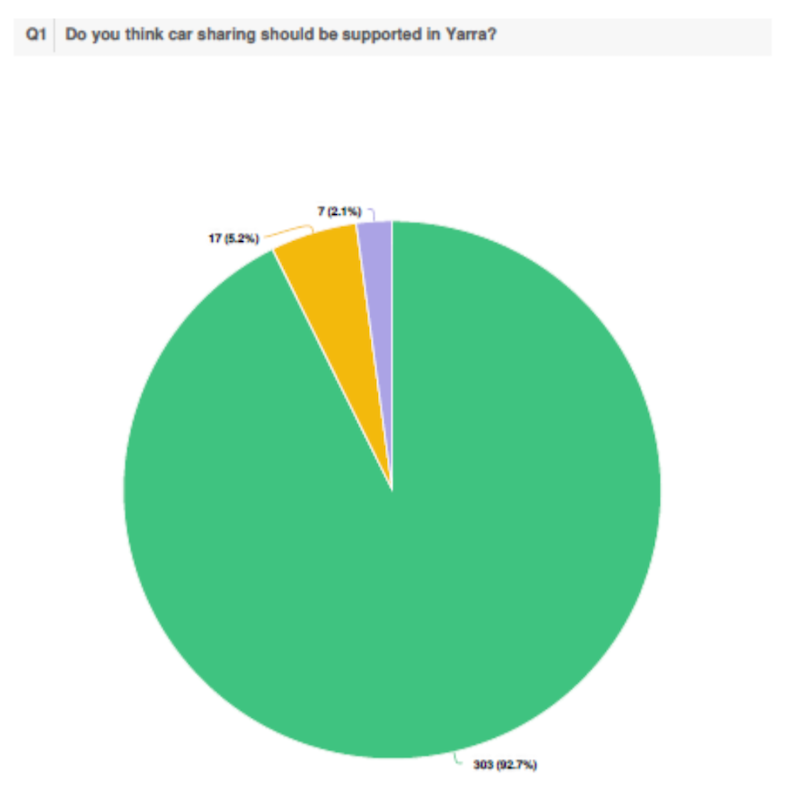The City of Yarra will consider a proposed car sharing policy on 16th July 2019. The Council Report shows how crooked thinking has permeated the policy development process, producing a farcical failure of a policy for Councillors to consider.

The Council Report (part of the Council Meeting Agenda) and Draft Car Share Policy are available for download at:
https://www.yarracity.vic.gov.au/events/2019/07/16/council-meeting-16-july-2019
In summary, the draft policy proposes to increase the number of car sharing vehicles in the City of Yarra from 152 to 283 over five years, and to restrict where car sharing bays can be sited. The first paragraph of the report (in the section titled Key Issues) dives right into crooked thinking, alleging that providing additional on street car share bays is ‘sensitive’ in the community. The crookedness is that this statement directly contradicts Council’s own community consultation which showed 93% support for car sharing.


The Council Report claims (again in the Key Issues section) that ‘it will not be possible to produce and implement a car share policy that …stakeholders all think is perfect in all aspects’. This is inane. Nobody in policy and politics is expecting to make all stakeholders perfectly happy. We do expect something much more reasonable – a policy that is supported both by the evidence as well as by 93% of the community – such as an increase to 1,000 car sharing vehicles.
The report references many factual, objective, quantifiable pieces of evidence that support a significant expansion of car sharing. In contrast the arguments against car sharing are emotive and subjective. The report even describes how the anti-car-sharing arguments (car sharing is taking my on-street car parking) are wrong (as adding car sharing decreases the demand for on-street parking). Yet, in the face of all the evidence and the report’s own logic, the report proposes a miserably low (and capped) increase in car sharing.
The core of the anti-car sharing argument appears to be that ‘Council receives a significant number of complaints about car sharing’. In other words, Council doesn’t want to get complaints. This isn’t evidence based policy, it’s ‘I don’t want to do my job’ policy. A much higher target of 1,000 car sharing vehicles is entirely ‘practical and deliverable’, as sought by paragraph 16 of the agenda, considering that 1,000 car sharing vehicles would:
- still only be a tiny 3% of the approximately 30,000 parking permits that Yarra distributes,
- would take 7,000 to 10,000 cars off the road (according to evidence referenced in the Council Report),
- would significantly decrease competition for on-street parking,
- would increase mobility for thousands of people, including those on low incomes, who don’t own their own car, and
- would enable thousands of residents to decrease their carbon emissions, helping our climate emergency.
The Council Report attempts to justify its recommendations by stating that ‘we’ve put a lot of work into it’. A policy isn’t justified by working on it a long time, a policy is justified because it is supported by both the evidence and by 93% of the community.
The Council Report attempts to dismiss the strong community support for car sharing, as measured by Councils own survey, by referencing unsubstantiated, unquantified anecdotal evidence. This is farcical. Is Council saying that the results of its own survey aren’t valid because the wrong type of people gave feedback? What’s next – will Council conduct a survey asking whether footpaths should be widened, and then ignore the responses from everyone who walks, because they are footpath users?

Nowhere in the Council Report is the alleged problem of car sharing put into objective, quantifiable context, such as comparing the number of car sharing vehicles (or car sharing bays) with the total number of private vehicles (or on-street car parking bays) in Yarra. Such a comparison would show that the current 152 car sharing vehicles occupy the spaces of a pathetically small 0.5% of the roughly 30,000 parking permits distributed by Council. This is not high quality analysis. This is not presenting actionable intelligence to Councillors. Even if the number of car sharing vehicles increased to 1,000, the proportion of occupied bays would still be just 3%.
Council has a 10-year planning horizon, as demonstrated by the existence of Council’s 10-year Long Term Financial Strategy. The KPMG Melbourne Activity Based Model, referenced by Infrastructure Victoria, shows that several of Yarra’s streets are already at capacity. Over the next 10 years our population will continue to boom, bringing cars, congestion and gridlock with it. Yarra has a civic duty to allocate street space to enable people to get around, and in the face of gridlock this means enabling more people to walk, cycle and use public transport, supported by car sharing. We desperately need more car sharing, yet the policy only proposes to deliver a trivial amount.
Nowhere in the Council Report is the root cause of ratepayer complaints actually identified. When people complain about not being able to find a park, then the problem isn’t car sharing, the problem is that Council is failing to manage demand for on-street parking. If demand is far higher than supply, then the solution is to manage demand by reducing the number of parking permits or by increasing the price of parking permits. By failing to manage demand, Council is creating a barrier to the expansion of car sharing, which is a key requirement to enable people to transition to active transport, which in turn is key to avoiding gridlock and responding to our climate emergency.
The Council Report admirably proposes to require some car sharing vehicles to be able to transport a motorised wheelchair. However, the Council Report then sets the policy up to fail by restricting the total number of car sharing vehicles. To deliver mobility for people who use motorised wheelchairs, car sharing services need scale. If Council wants to deliver improved mobility for everyone, including people using wheelchairs, then the rational conclusion is to enable car sharing to grow to 1,000 vehicles.
The Council Report fails to consider probably unintended consequences – Car Next Door (peer to peer car sharing) already has 200 vehicles across Yarra, more than the 152 bays occupied by traditional car share providers such as GoGet and Flexicar. If Council adopts the proposed car sharing policy, the unintended consequence will be rapid growth of unregulated and unmanaged car share vehicles such as Car Next Door. The first sentence of the proposed policy claims that the objective is to ‘ensure that the expansion of the car share network within the City is well-governed and transparent’. This is hypocritical because it’s entirely foreseeable that restricting traditional providers will cause un-governed and non-transparent growth via Car Next Door. It’s far better to allow traditional car sharing to grow and to enable that growth to be overseen by Council.
Overall, the Council Report demonstrates crooked thinking at the expense of straight thinking. The crooked thinking is so bad it’s in danger of being used as a case study in the next edition of ’Straight and Crooked Thinking’ by Thouless, first published in 1930. Councillors can prevent a descent into farce by amending the policy prior to adoption, including:
- 7.2 change ‘283’ to ‘1,000’
- 7.3 delete
- 7.4 amend to enable 200 new on-street bays per year
- 7.10 amend to enable the ‘new total’ to be proportional to the forecasted population of each small census area in 2024, with a sum equalling 1,000 vehicles
- 8.2 (i) delete
- 8.3 (viii) delete
- 8.3 (xiv) delete
- 8.3 (xv) delete
- 12.3 delete
- Attachment 2.2.2 delete
- Attachment 2.2.3 delete
- Attachment 2.2.4 delete
Originally published on 14th July 2019 as an article on LinkedIn.
